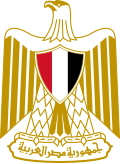Denmark–Egypt relations
 From Wikipedia - Reading time: 9 min
From Wikipedia - Reading time: 9 min
 | |
Denmark |
Egypt |
|---|---|
Denmark–Egypt relations are foreign relations between Denmark and Egypt. Denmark has an embassy in Cairo,[1] and consulates in Suez, Port Said and Cairo.[2] Egypt has an embassy in Copenhagen. Both countries are members of the Union for the Mediterranean.
The Jyllands-Posten Muhammad cartoons controversy in 2006 caused a diplomatic crisis between Denmark and Egypt.[3]
After Per Stig Møller's visit to President Hosni Mubarak in 2008, Mubarak described the bilateral relations as good and fruitful and expressed his support for their further expansion, especially in economic cooperation.[4]
Political relations
[edit]The Egyptian Minister of Foreign Affairs, Aboul Gheit, wrote several letters to the Prime Minister of Denmark and to the United Nations Secretary-General explaining that they did not want the Prime Minister to prosecute Jyllands-Posten; they only wanted "an official Danish statement underlining the need for and the obligation of respecting all religions and desisting from offending their devotees to prevent an escalation which would have serious and far-reaching consequences".[5] Subsequently, the Egyptian government played a leading role in defusing the issue in the Middle East.[6]
Egyptian newspaper al-Fagr reprints some of the cartoons, describing them as a "continuing insult" and a "racist bomb". and argued that they are blasphemous to people of the Muslim faith, are intended to humiliate a Danish minority, or are a manifestation of ignorance about the history of Western imperialism.[7][8]
Danish reaction to the Egyptian Revolution of 2011
[edit]"He is finished as Egypt's leader. The only matter for discussion is how quickly that materialises ... We are not electing a new Egyptian leader. That is something the Egyptians themselves have to do. But what we need is that before Hosni Mubarak leaves the presidential palace he has to provide a roadmap for democracy."
During the Egyptian Revolution of 2011, Minister for Foreign Affairs Lene Espersen strongly condemned the alleged Egyptian authorities' actions against the protests.[13] Danish-Palestinian politician Naser Khader urged Mubarak to resign.[14] Danish Foreign Ministry also warned against all travel to Egypt.[15]
Cooperation
[edit]In 1940s commercial exchanges between Denmark and Egypt amounted 7 million DKK.[16] An agreement on Culture, Science and Education was signed on 29 October 1972.[17] In 1970, Denmark assisted Egypt with 9.7 million DKK, for wheat and flour.[18]
Development assistance
[edit]Egypt was from 1989 to 2008 a program country for Denmark. 6 billion dollars were given for the support of the Egyptian projects, including a wind farm in Zafarana close to Ain Sukhna.[19]
High level visits
[edit]In October 2008, Per Stig Møller visited Hosni Mubarak. Hosni Mubarak visited Denmark on 17 December 2009.[20] A delegation from the Egyptian Education Committee visited Denmark in 2007.[21]
See also
[edit]References
[edit]- ^ "Danish embassy in Cairo". Archived from the original on 2011-02-24. Retrieved 2011-01-14.
- ^ "Danish representatives in Egypt". Archived from the original on 2010-12-26. Retrieved 2011-01-14.
- ^ Egypt discontinues dialogue with Denmark on human rights[permanent dead link]
- ^ Danish foreign minister visits Egypt Archived 2011-07-19 at the Wayback Machine Embassy of Denmark, Cairo
- ^ "Egypten gav Fogh mulighed for forsoning" (in Danish). Politiken. 22 February 2006. Archived from the original on 25 November 2011. Retrieved 14 January 2011.
- ^ "Egypten stod bag profetkampagne" (in Danish). Politiken. 17 February 2006. Archived from the original on 2 July 2011. Retrieved 14 January 2011.
- ^ "Danes Blame Imams for Satire Escalation, Survey Says (Update1)". Bloomberg. 10 February 2005. Archived from the original on 26 June 2009. Retrieved 6 March 2017.
- ^ "No Danish Treatment for an Egyptian Newspaper". FreedomForEgyptians. 8 February 2006. Archived from the original on 14 March 2011. Retrieved 14 January 2011.
- ^ Staff writer (2011-02-03). "Danish Prime Minister: Mubarak Is Finished". Politiken. Archived from the original on 2011-02-05. Retrieved 2011-02-03.
- ^ [clarification needed] Bluhme, Kate (2011-02-03). "Løkke: Mubarak er ikke præsident mere – Egypterne vil ikke stille sig tilfredse med, at politisk ereformer er sendt til hjørnespark indtil september, erklærer statsminister Lars Løkke Rasmussen" [Løkke: Mubarak Ain't President Anymore]. Ekstra Bladet (in Danish). Archived from the original on 2011-07-19. Retrieved 2011-02-03.
- ^ Staff writer (2011-02-01). "Løkke: Egypternes reformkrav er legitime" [Løkke: Egyptians Reform Requirements Are Legitimate] (in Danish). TV 2/Lorry (part of TV 2). Archived from the original on 2011-07-19. Retrieved 2011-02-02.
- ^ Staff writer (2011-02-03). "Løkke: Egyptens Hosni Mubarak er færdig" (in Danish). Ritzau (via Jyllands-Posten). Archived from the original on 2011-02-04. Retrieved 2011-02-03.
- ^ Sircic, Adnan (2011-01-28). "Uroligheder bekymrer Lene Espersen" [Unrests Worries Lene Espersen]. DR (in Danish). Archived from the original on 2011-02-01. Retrieved 2011-02-02.
- ^ Nielsen, Jes Højen (2011-01-31). "Espersen Expects Strong EU Reaction". DR. Archived from the original on 2011-06-28. Retrieved 2011-02-03.
- ^ Staff writer (2011-01-31). "Foreign Ministry Warns Against All Travel to Egypt". The Copenhagen Post (via Jyllands-Posten). Archived from the original on 2011-02-01. Retrieved 2011-02-03.
- ^ "Egypt today: news bulletin, press section". Egypt: Le Scribe egyptien. 1947.
- ^ Agreement on cultural, educational and scientific cooperation. Signed at Cairo on 29 October 1972
- ^ "Record of the Arab world: yearbook of Arab and Israeli politics". Egypt: Research and Pub. House. 1970.
- ^ "Danish facts about Egypt". Archived from the original on 2008-12-08. Retrieved 2011-01-14.
- ^ "Bilateral relations between Denmark and Egypt". Archived from the original on 2010-11-13. Retrieved 2010-06-28.
- ^ "Egyptian European relations". Archived from the original on 2008-12-02. Retrieved 2010-11-19.
External links
[edit]- "A delegation from the Education Committee at the People's Assembly visits Denmark". Foreign Affairs of Egypt. 7 September 2007. Archived from the original on 2 December 2008. Retrieved 6 February 2011.
 KSF
KSF
